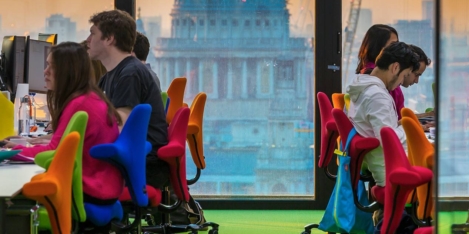May 1, 2017
Government should end bogus gig economy jobs, claims parliamentary report 0
 Companies operating in the gig economy and relying on supposedly self-employed workers are denying workers their rights and freeloading on the welfare state, according to a new report from The Commons Work and Pensions Committee. The report cites what it calls “appalling practices” in its inquiry into self-employment and the gig economy. The committee said the numbers of self employed had grown to 5m, or 15 per cent of all UK workers in recent years, fuelled in large parts by the firms like Uber and Deliveroo, whose business models rely on a largely self-employed workforce. In its report the Work and Pensions Committee says Government must close the loopholes that are currently allowing “bogus” self-employment practices, which are potentially creating an extra burden on the welfare state while simultaneously reducing the tax contributions that sustain it.
Companies operating in the gig economy and relying on supposedly self-employed workers are denying workers their rights and freeloading on the welfare state, according to a new report from The Commons Work and Pensions Committee. The report cites what it calls “appalling practices” in its inquiry into self-employment and the gig economy. The committee said the numbers of self employed had grown to 5m, or 15 per cent of all UK workers in recent years, fuelled in large parts by the firms like Uber and Deliveroo, whose business models rely on a largely self-employed workforce. In its report the Work and Pensions Committee says Government must close the loopholes that are currently allowing “bogus” self-employment practices, which are potentially creating an extra burden on the welfare state while simultaneously reducing the tax contributions that sustain it.






 New guidance to help facilities managers manage the transition to agile working within their organisation has just been published by the British Institute of Facilities Management (BIFM). The Agile Working Change Management Guidance Note is aimed at FMs working at a senior and/or operational level and covers the benefits of agile working and how to successfully plan and implement an integrated approach to deliver sustainable change in working behaviour. Agile working describes a range of work settings that allow people and organisations to make new choices about when, where and how they work. It is underpinned by mobile technology and applies to people working both in and away from the traditional office, such as at home, on the road or remotely in other locations. BIFM’s research and information manager Peter Brogan said: “As an Institute, we recognise the importance of the workplace agenda for FMs and this newly commissioned Guidance Note aims to address the current lack of knowledge around some of the emerging workplace practices.”
New guidance to help facilities managers manage the transition to agile working within their organisation has just been published by the British Institute of Facilities Management (BIFM). The Agile Working Change Management Guidance Note is aimed at FMs working at a senior and/or operational level and covers the benefits of agile working and how to successfully plan and implement an integrated approach to deliver sustainable change in working behaviour. Agile working describes a range of work settings that allow people and organisations to make new choices about when, where and how they work. It is underpinned by mobile technology and applies to people working both in and away from the traditional office, such as at home, on the road or remotely in other locations. BIFM’s research and information manager Peter Brogan said: “As an Institute, we recognise the importance of the workplace agenda for FMs and this newly commissioned Guidance Note aims to address the current lack of knowledge around some of the emerging workplace practices.”




























